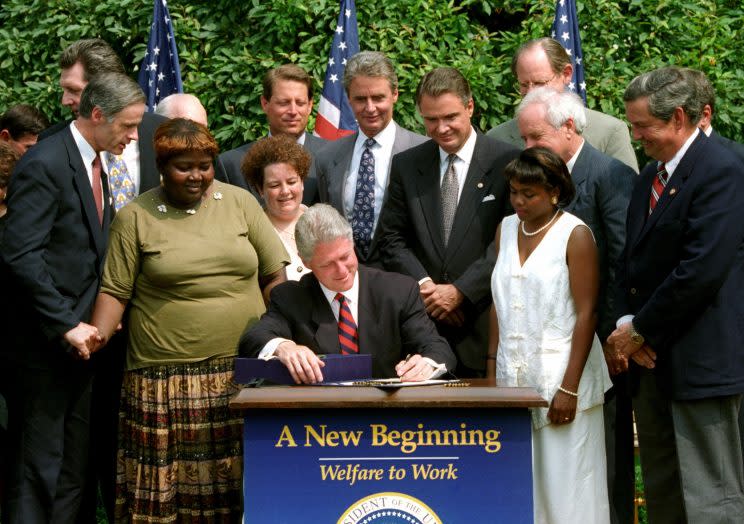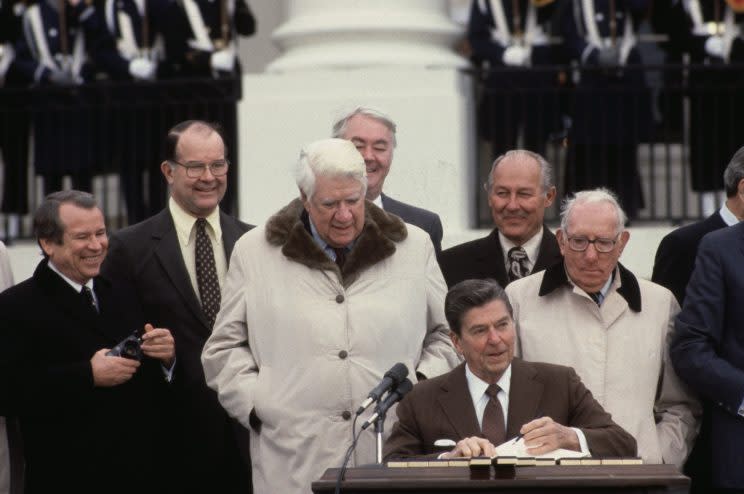Why it’s so hard to ‘repeal and replace’ Obamacare—or almost anything else

The Republican health care bill is in deep trouble in the Senate. After promising to repeal and replace Obamacare for seven straight years, Republicans, who have unified control of Washington, still haven’t delivered on this long-cherished goal. Tuesday afternoon, Senate Majority Leader Mitch McConnell said he was delaying the vote until after the July 4 recess.
Perhaps it shouldn’t be terribly surprising. Conservative Republicans have devoted decades to talking about repealing social insurance and social welfare programs and replacing them with free-market alternatives. But since the New Deal, most of these programs have proven resistant to significant rollbacks. The GOP’s rhetorical broadsides have not sunk, or even substantially diminished, many of these programs.
One of the few exceptions is the 1996 passage of welfare reform. Back then, President Bill Clinton, eager to define himself as a “new Democrat” willing to reform government assistance programs that seemed to need improvement, signed welfare reform into law after it passed with help from Republican House Speaker Newt Gingrich. The new approach, Temporary Assistance for Needy Families, turned an open-ended assistance program into a time-limited system pegged to recipients’ work efforts. The law enabled Republicans to wed their racially charged critique of the “underserving poor” to their warnings of government dependency, while Clinton could demonstrate that responsible reforms to social programs could give the poor more opportunity. Each side had ideological and political incentives to see reform through.
But such occasions are rare. Conservatives Barry Goldwater and Ronald Reagan called for gutting Social Security in the mid-1960s, and in 1981 President Reagan entertained the idea of enacting deep cuts to Social Security. But the latter proposal sparked such a backlash that he passed the buck to a bipartisan commission to recommend reforms to the program. Reagan later signed legislation that trimmed some benefits but also raised taxes to strengthen Social Security and extend the life of the trust fund for decades.
In early 2005, shortly after winning a second term, President George W. Bush tried to establish “voluntary personal retirement accounts” for Social Security. The White House launched a publicity campaign to sell the idea to the public. But even with healthy GOP congressional majorities, Social Security reform was a bust. It never even came up for a vote. The proposal threatened the reliability of Social Security on which millions of Americans depended. In March 2005, an ABC News/Washington Post poll found that a strong majority, 56 to 35, disapproved of Bush’s proposal.

Medicare and Medicaid have also proven highly resistant to radical changes in how these programs work. Speaker of the House Paul Ryan has tried for years to transform Medicare, which is a single payer model with government directly covering seniors’ health care costs, into a “premium support” — critics call it “vouchers” — plan with seniors receiving federal subsidies to purchase private insurance. This aim has become a core part of Ryan’s policy identity. Yet it remains dormant and highly unlikely to come up for votes any time soon. Even though he now holds the speaker’s gavel and has an ally in the White House, Ryan’s idea has gained little traction with the public, and with repeal and replace on life support, it’s hard to see how Ryan’s sweeping Medicare transformation gets done.
Rather than trim entitlements, Bush and a Republican Congress did the opposite, adding Part D, a drug benefit, to Medicare in 2003, over the objections of conservatives who criticized it as a budget-busting add-on that didn’t fundamentally reform the Medicare program.
Medicaid has also survived proposals for market-based reforms that would have changed its character. Medicaid enjoys some important champions. The program helps Americans living near or below the poverty line gain access to health care. It aids the working poor, including some of Trump’s voters in such deep-red states as West Virginia, Kentucky and Alaska, which is why some GOP senators are reluctant to cut it. Medicaid also covers costs for seniors in nursing homes, and it has proven vital to people with disabilities, helping them receive in-home health aid and enabling them to stay in their homes rather than be institutionalized.
The deep Medicaid cuts in the GOP’s Senate bill, and the proposal to turn Medicaid into block grants, have made it much harder politically (and perhaps morally) for relatively moderate conservative Senators such as Maine’s Susan Collins, Alaska’s Lisa Murkowski and Nevada’s Dean Heller to vote for an overhaul and roll back this social program. Even a program that is designed to help some of America’s most vulnerable populations has had enough popular support to resist the campaign to unwind it.
A central paradox in American politics is that Americans distrust the federal government’s commitment to the public’s welfare, yet Americans in the main are also opposed to fundamentally reforming the government’s costliest social programs. Conservative Republicans have scored political points by railing against social programs that they say are going broke, miring government in debt, and helping undeserving folks. But when the abstract turns to concrete revisions, these same Republicans have mostly failed to fulfill their pledges to reform, repeal and replace the pillars of the social welfare state.
Matthew Dallek, associate professor at George Washington University’s Graduate School of Political Management, is author of Defenseless Under the Night: The Roosevelt Years and the Origins of Homeland Security.
Read more from Yahoo News:

